Simple Home Remedies for Skin Allergies and Rashes
By Dr Rajeev Singh +2 more

Get,

to manage your symptom
Get your,


4 Cr+ families
benefitted

OTP sent to 9988776655



You’ve successfully subscribed to receive
doctor-approved tips on
Whatsapp

Get ready to feel your best.

Hi There,
Download the PharmEasy App now!!


Register to Avail the Offer
Send OTPBy continuing, you agree with our Privacy Policy and Terms and Conditions

Hi There,
Sign up on PharmEasy now!!
Trusted by 4 crore+ families

OTP sent to 9988776655



You have unlocked 25% off on medicines




Code: NU25
By Dr Rajeev Singh +2 more
Table of Contents
Dealing with skin allergies and rashes can be annoying. However, sometimes, simple home remedies can offer relief. Using ingredients you have at home, along with soothing techniques, can help ease irritation and support the healing process. While it’s always best to consult a doctor for persistent or severe conditions, here are some home remedies you can explore to ease discomfort.
Friendly Reminder: The information shared here is for educational purposes only and the reader should consult a registered medical practitioner before implementing any changes to their health routine.

Skin allergy can result from external environmental allergens like pollen, moulds, plant or animal dander, and particular food or medications. Listed below are some common allergens:
When the skin comes in contact with a substance that irritates (allergen), it alerts the immune system, leading to a skin rash. This condition is called allergic contact dermatitis, where dermatitis simply means skin irritation[2].
If you can avoid the substance causing the reaction, the rash usually clears up in 2 to 4 weeks. Try using a cool, wet cloth and other self-care steps at home to soothe your skin. If the symptoms worsen, visit a dermatologist.
Dr. Ashish Bajaj, MBBS, MD in Clinical Pharmacology and Toxicology
Skin allergies and rashes can occur for multiple reasons. It occurs within minutes, hours, or days after coming in contact with an allergen. Whenever our skin comes in contact with an allergen, it develops symptoms called allergic contact dermatitis[2]. Whenever it happens, it can be recognised by knowing that the rash:
Skin allergies and rashes are common occurrences as we encounter several potential allergens daily. Treatment for these rashes can be of various types, as your doctor will suggest. It might take time for the rash to go away even after beginning the treatment. However, here are some popular home remedies for skin rashes that you can try if permitted by your doctor in addition to the prescribed treatment.
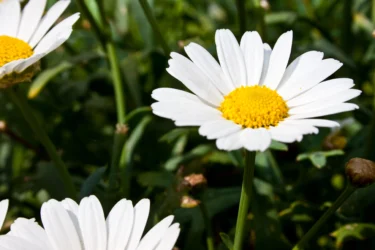
The scientific name of German chamomile is Matricaria recutita L. The flower can be used externally to manage skin inflammation, rashes, and eczema, among many other allergic skin conditions. Human studies show it is more effective than hydrocortisone (a constituent of creams used to treat rashes) in managing chemical-induced toxic dermatitis[4]. As a skin allergy home remedy, you can use a few teaspoons of German chamomile leaves to brew a tea and drink it. It is also a constituent of various ointments available in the market. You can also use the German chamomile flower extract by making a paste of the flowers and gently dabbing it over the rash.
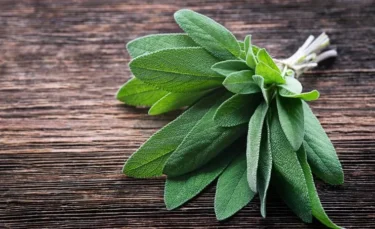
Sage leaf is one of the home remedies for skin rashes. Sage is a medicinal plant native to the Mediterranean region and has been used in herbal medicine for ages to manage minor skin inflammations. In laboratory and animal studies, it was found that certain compounds present in sage showed inflammation-alleviating properties[7]. Use of this in children below the age of 18 and pregnant and lactating women is not recommended[4]. Using a cotton swab, you can use sage oil made from the sage leaf and apply it gently over the rash

In a clinical trial, it was seen that evening primrose can reduce the symptoms of atopic dermatitis[4]. It was also found to reduce the symptoms of eczema when applied topically to rashes. Therefore, you can use evening primrose as a skin allergy home remedy. It might help reduce inflammation, dryness, itch, and skin exfoliation (removal of dead cells). Please note that it should not be used by people with schizophrenia and epilepsy, children, or pregnant and breastfeeding women. You can use it as a natural home remedy for skin rashes by adding a few drops of evening primrose essential oil to tea and drinking it. You can also apply the essential oil to rashes.
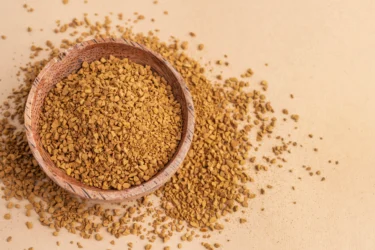
Fenugreek seeds are a part of traditional herbal medicine for managing eczema and mild local skin inflammation. In animal studies, fenugreek seed extract exhibited inflammation-alleviating properties[4]. It should not be used by children and adolescents below 18. There is a need for more studies on humans to prove its efficacy; nonetheless, it is being used as one of the home remedies for skin rashes. You can use it as a skin allergy home remedy by taking a few fenugreek seeds, boiling them in water, and using the water for bathing.
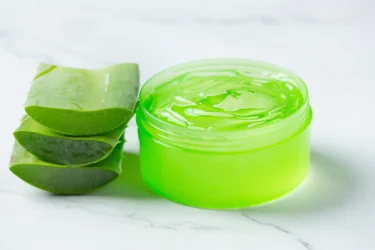
In animal studies, aloe vera gel reduced acute (adverse or extreme) skin inflammation. The presence of enzymes, sterols, and carbohydrates contributes to the inflammation-reducing property of aloe vera gel[6]. It can be used topically for minor skin inflammations and inflammation disorders. Rarely, it may cause allergy on contact, so use it cautiously. Moreover, the use of freshly extracted aloe vera gel is more beneficial[4]. You can use fresh aloe vera leaf to obtain the gel and apply it to your rash as a natural home remedy for skin rashes. It might help soothe your skin rash.
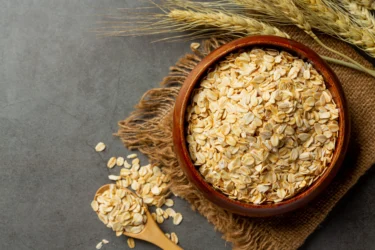
Oat straw is scientifically known as the Avenae stratum. It contains a lot of bioactive compounds. It can deal with many skin inflammations and seborrheic (disease-causing scaling and flaking of the skin) skin diseases, especially those accompanied by itching[5]. You can use oats as a home remedy for skin rashes by mixing little oats in curd and honey and applying it to your skin rashes. This can also be used as a home remedy for facial skin allergy.
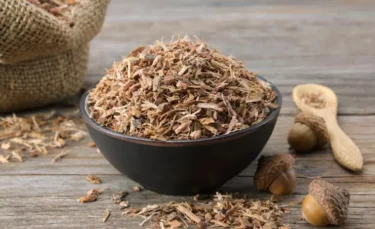
As a traditional herbal medicine, oak bark has been used to manage minor skin inflammation[8], purulent skin diseases (diseases with pus discharge from skin rashes) and exuding eczema (fluid-filled skin blistering). The use of oak bark was reported to cause allergies in some cases, so be cautious while using it. Using oak bark for longer than a week and in children and adolescents below 18 years is not recommended[4]. You can use the oak tree’s bark as a home remedy for skin allergies by using it to prepare baths by adding the oak bark or oak bark essential oil.

Flaxseeds are scientifically known as Linum usitatissimum. It is cultivated worldwide but mainly in India, Turkey, Morocco, and Argentina. It contains many bioactive components and might have skin smoothening (emollient), irritation relieving (demulcent), and inflammation-alleviating properties, all beneficial for skin allergies and rashes[9]. Flaxseeds can be used as a warm compress by wrapping the seeds in a cloth, gently warming them, and applying them to swellings and rashes[4]. You can also gain its beneficial effects by adding it to your diet.
Though studies show the benefits of the above mentioned herbs and home remedies, these are insufficient to prove their effectiveness in treating skin allergies. Further studies and trials are needed to establish the true extent of the benefits of these herbs and home remedies for human health.
Also Read: Best Home Remedies for Clear Skin
You should contact your doctor if you notice one of the following symptoms:
Also Read: 16 Simple Home Remedies for Glowing Skin!
If you see a red area associated with pain and swelling, it might be a rash. A skin allergy to an animal or plant substance, metal, etc., might be what caused your rash. Skin rashes are caused mainly by an inflammatory reaction to allergens (substances that cause allergy). So, to treat it rightly, you need to identify the cause first. Even after all of this, it might take some time for the rash to disappear. There are home remedies for skin allergies like oak bark, flaxseeds, aloe vera gel, and German Chamomile that you can try. However, if the rash gets worse and doesn’t go away or if you notice the signs of infection (redness, swelling and heat), you should consult your dermatologist (skin and hair doctor) and seek their medical advice.
Also Read: Beauty Benefits of Using Ice Cubes On The Skin
No, there is no evidence showing the benefit of green tea for skin allergies.
Yes, skin allergies can occur due to grass. Skin allergy can be caused by a substance in the environment, such as plant and animal substances, pollen, or mould[3].
No, skin allergy is not contagious. You cannot get it from person-to-person contact. It occurs when the skin comes in contact with an allergen (allergy-causing substance)[2].
1. Rashes [Internet]. MedlinePlus. [cited 2022 Jun 6]. Available from: https://medlineplus.gov/rashes.html
2. ACAAI Patient. Skin allergies | Causes, symptoms & treatment | ACAAI Public website [Internet]. 2024 [cited 2025 Feb 4]. Available from: https://acaai.org/allergies/allergic-conditions/skin-allergy/
3. Dawid-Pać R. Medicinal plants used in the treatment of inflammatory skin diseases. Adv Dermatology Allergol [Internet]. 2013;3(3):170–7. Available from: https://www.ncbi.nlm.nih.gov/pmc/articles/PMC3834722/
4. Shenefelt PD. Herbal treatment for dermatologic disorders [Internet]. Benzie I, Watchel-Galor S, editors. Herbal Medicine: Biomolecular and Clinical Aspects: Second Edition. Boca Raton (FL): CRC Press/Taylor & Francis; 2011. 383–403 p. Available from: https://www.ncbi.nlm.nih.gov/books/NBK92761/
5. DermNet. Oatmeal. DermNet®. 2023 [cited 2025 Feb 25]. Available from: https://dermnetnz.org/topics/oatmeal
6. Sánchez M, González-Burgos E, Iglesias I, Gómez-Serranillos MP. Pharmacological update properties of Aloe Vera and its major active constituents. Molecules. 2020 Mar 13 [cited 2025 Feb 25]. Available from: https://pubmed.ncbi.nlm.nih.gov/32183224/
7. Sage (Salvia officinalis) extract enriched for ursolic acid clinically reduces skin sensitivity to irritants and lightens the appearance of facial hyperpigmentary spots. Journal of the American Academy of Dermatology. 2018 Aug 2 [cited 2025 Feb 25]. Available from: https://www.jaad.org/article/S0190-9622(18)31799-7/abstract
8. Applications of topical oak bark extract in dermatology: Clinical examples and discussion. PubMed. 2019 [cited 2025 Feb 25]. Available from: https://pubmed.ncbi.nlm.nih.gov/30811144/9. Nowak W, Jeziorek M. The role of flaxseed in improving human health. Healthcare. 2023 Jan 30 [cited 2025 Feb 25]. Available from: https://pmc.ncbi.nlm.nih.gov/articles/PMC9914786/#sec11-healthcare-11-00395
Disclaimer: The information provided here is for educational/awareness purposes only and is not intended to be a substitute for medical treatment by a healthcare professional and should not be relied upon to diagnose or treat any medical condition. The reader should consult a registered medical practitioner to determine the appropriateness of the information and before consuming any medication. PharmEasy does not provide any guarantee or warranty (express or implied) regarding the accuracy, adequacy, completeness, legality, reliability or usefulness of the information; and disclaims any liability arising thereof.
Comments

Leave your comment...
You may also like
Comments